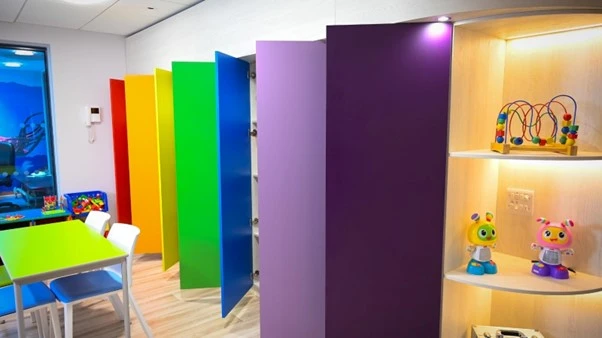How can hospices use sensory stimulation?
Posted on 25 April 2018 By Aaron Stretton

In This Article
Holistic treatments have been embraced by hospices all over the country, and with good reason. Sensory stimulation has proven to…
Holistic treatments have been embraced by hospices all over the country, and with good reason. Sensory stimulation has proven to be a particularly useful therapy for children in SEN schools, so we were wondering if this could be extended to hospice care.
As it turns out, sensory therapy is already being used for two types of hospice patients; those with dementia, and terminally ill children. So we’ve examined how it’s been put to use and how it could be adopted more widely in other hospices.
Children & Sensory Stimulation
Sensory stimulation is used with children all around the world — and we often don’t even realise we’re doing it. Baby playmats are brightly-coloured and full of things that feel interesting and make different sounds.
Whether it’s a squeaky toy or a crinkly comforter, we’re providing sensory stimulation for children. This helps kids learn and relax.
This same principle is used in sensory therapy in SEN schools and even in hospices. By having items that look interesting, feel interesting, smell interesting, and sound interesting, children are much more interested and engaged with their surroundings.
This is why sensory stimulation is so important in children’s hospices; it’s a kind of therapy for children and can have a massive effect on their well-being. The use of certain colours and effects can promote different emotions and help kids to relax which is integral for patients that are particularly ill.
It also encourages kids to be more present and focus on what is in front of them rather than getting upset about their situation or even their pain.
Both Acorns Hospice and Rainbows Hospice have sensory facilities that they use with their paediatric patients, as well as offering the facilities to their families.
Sensory in Dementia Care
But sensory therapy isn’t just reserved for children — it’s also now being used for adults with dementia. Whilst it might not be quite the same method as children’s sensory treatment, both techniques achieve the same results; stimulation, communication, and relief.
One particular UK-based group have been promoting sensory therapy for dementia patients in hospices for a few years. Namaste Care focuses on delivering patient-centred care that will help people to relax and reminisce. (“Namaste” is a Hindu greeting that translates to ‘honour the spirit within’.)
Using music, relaxing lighting, and the scent of essential oils, Namaste Care engages the patient’s senses and promotes a calm atmosphere that allows the individual to relax. Their staff even give hand and foot massages to further stimulate the patients.
This stuff isn’t just to get the patients to relax — it’s to get them to communicate. People with advanced dementia can often close off and cease talking with other people.
For lots of them, the only contact or interaction they have throughout the day (when living in a hospice or care home) is when eating or drinking. The organisation has found that their sensory treatments have had an impact on the way that people with dementia interact and communicate with others.
And not only that, it’s shown to have had a positive effect on patients’ personal care, quality of sleep, appetite, and mental health.
Can it be implemented in other hospices?
In short, we believe that sensory therapy can and should be used more frequently in hospices across the country. Hospices regularly promote activities and events where residents can socialise with one another take part in arts and crafts and such, but it is possible to take further steps to improve quality of life.
If sensory treatment can be used as a form of pain management for children, then it could well be extended to adults. Although patients who are closer to the end of life may not physically be able to experience as much sensory stimulation as others; lighting, smells, and sound can still be used to promote a relaxing atmosphere so that they can spend their remaining time in a dignified and calm state.
We think you might also be interested in...
Speak to The Experts
Need assistance with product enquiries, general inquiries, or product support? Our Phonelines are open 9am - 5pm Monday to Friday
0113 519 0319
Or, fill out the form for a call back.
